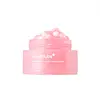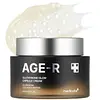What's inside
What's inside
 Key Ingredients
Key Ingredients

 Benefits
Benefits

 Concerns
Concerns

 Ingredients Side-by-side
Ingredients Side-by-side

Water
Skin ConditioningGlycerin
HumectantNiacinamide
SmoothingMethylpropanediol
SolventPropanediol
Solvent1,2-Hexanediol
Skin ConditioningDipropylene Glycol
HumectantCaprylic/Capric Triglyceride
MaskingGlycereth-26
HumectantArginine
MaskingButylene Glycol
HumectantEthylhexyl Palmitate
EmollientCetearyl Alcohol
EmollientCarbomer
Emulsion StabilisingCetearyl Olivate
Sorbitan Olivate
EmulsifyingAmmonium Acryloyldimethyltaurate/Vp Copolymer
Simethicone
EmollientEclipta Prostrata Extract
Skin ConditioningEthylhexylglycerin
Skin ConditioningAdenosine
Skin ConditioningPolyacrylate-13
Sodium Dna
Skin ConditioningDisodium EDTA
Melia Azadirachta Leaf Extract
Skin ConditioningPolyisobutene
Hydrolyzed Sclerotium Gum
HumectantGlyceryl Stearate
EmollientMoringa Oleifera Seed Oil
EmollientPolysorbate 20
EmulsifyingSorbitan Isostearate
EmulsifyingSodium Hyaluronate
HumectantGlutathione
Octyldodecanol
EmollientHydroxypropyltrimonium Hyaluronate
Salmon Egg Extract
Hydrogenated Lecithin
EmulsifyingCeramide NP
Skin ConditioningCyanocobalamin
Skin ConditioningThioctic Acid
AntioxidantHydrolyzed Hyaluronic Acid
HumectantHydrolyzed Collagen Extract
Skin ProtectingSodium Acetylated Hyaluronate
HumectantAcetyl Hexapeptide-8
HumectantCopper Tripeptide-1
Skin ConditioningHyaluronic Acid
HumectantCaprylyl Glycol
EmollientPalmitoyl Pentapeptide-4
Skin ConditioningHydrolyzed Sodium Hyaluronate
Skin ConditioningPalmitoyl Hexapeptide-12
Skin ConditioningSodium Hyaluronate Crosspolymer
HumectantPotassium Hyaluronate
Skin ConditioningWater, Glycerin, Niacinamide, Methylpropanediol, Propanediol, 1,2-Hexanediol, Dipropylene Glycol, Caprylic/Capric Triglyceride, Glycereth-26, Arginine, Butylene Glycol, Ethylhexyl Palmitate, Cetearyl Alcohol, Carbomer, Cetearyl Olivate, Sorbitan Olivate, Ammonium Acryloyldimethyltaurate/Vp Copolymer, Simethicone, Eclipta Prostrata Extract, Ethylhexylglycerin, Adenosine, Polyacrylate-13, Sodium Dna, Disodium EDTA, Melia Azadirachta Leaf Extract, Polyisobutene, Hydrolyzed Sclerotium Gum, Glyceryl Stearate, Moringa Oleifera Seed Oil, Polysorbate 20, Sorbitan Isostearate, Sodium Hyaluronate, Glutathione, Octyldodecanol, Hydroxypropyltrimonium Hyaluronate, Salmon Egg Extract, Hydrogenated Lecithin, Ceramide NP, Cyanocobalamin, Thioctic Acid, Hydrolyzed Hyaluronic Acid, Hydrolyzed Collagen Extract, Sodium Acetylated Hyaluronate, Acetyl Hexapeptide-8, Copper Tripeptide-1, Hyaluronic Acid, Caprylyl Glycol, Palmitoyl Pentapeptide-4, Hydrolyzed Sodium Hyaluronate, Palmitoyl Hexapeptide-12, Sodium Hyaluronate Crosspolymer, Potassium Hyaluronate
Water
Skin ConditioningGlycerin
HumectantGlycereth-26
HumectantButylene Glycol
HumectantMethylpropanediol
SolventVinyldimethicone
Niacinamide
Smoothing1,2-Hexanediol
Skin ConditioningBetaine
HumectantIsononyl Isononanoate
EmollientIsohexadecane
EmollientSodium Polyacrylate
AbsorbentAmmonium Acryloyldimethyltaurate/Vp Copolymer
Phenyl Trimethicone
Skin ConditioningDimethiconol
EmollientAroma
Chondrus Crispus Powder
AbrasiveC18-21 Alkane
SolventGlutathione
Ethylhexylglycerin
Skin ConditioningPolyglyceryl-10 Laurate
Skin ConditioningGlyceryl Acrylate/Acrylic Acid Copolymer
HumectantAgar
MaskingXanthan Gum
EmulsifyingHydrogenated Lecithin
EmulsifyingPolyglyceryl-10 Oleate
Skin ConditioningAdenosine
Skin ConditioningTromethamine
BufferingAcrylates/C10-30 Alkyl Acrylate Crosspolymer
Emulsion StabilisingGlucose
HumectantLimonene
PerfumingGellan Gum
Thioctic Acid
AntioxidantCaprylic/Capric Triglyceride
MaskingCeramide NP
Skin ConditioningSorbitan Laurate
EmulsifyingHydroxyethylcellulose
Emulsion StabilisingAcetyl Dipeptide-1 Cetyl Ester
Skin ConditioningPalmitoyl Tripeptide-5
Skin ConditioningAcetyl Hexapeptide-1
Skin ConditioningSoluble Collagen
HumectantWater, Glycerin, Glycereth-26, Butylene Glycol, Methylpropanediol, Vinyldimethicone, Niacinamide, 1,2-Hexanediol, Betaine, Isononyl Isononanoate, Isohexadecane, Sodium Polyacrylate, Ammonium Acryloyldimethyltaurate/Vp Copolymer, Phenyl Trimethicone, Dimethiconol, Aroma, Chondrus Crispus Powder, C18-21 Alkane, Glutathione, Ethylhexylglycerin, Polyglyceryl-10 Laurate, Glyceryl Acrylate/Acrylic Acid Copolymer, Agar, Xanthan Gum, Hydrogenated Lecithin, Polyglyceryl-10 Oleate, Adenosine, Tromethamine, Acrylates/C10-30 Alkyl Acrylate Crosspolymer, Glucose, Limonene, Gellan Gum, Thioctic Acid, Caprylic/Capric Triglyceride, Ceramide NP, Sorbitan Laurate, Hydroxyethylcellulose, Acetyl Dipeptide-1 Cetyl Ester, Palmitoyl Tripeptide-5, Acetyl Hexapeptide-1, Soluble Collagen
 Reviews
Reviews

Ingredients Explained
These ingredients are found in both products.
Ingredients higher up in an ingredient list are typically present in a larger amount.
1,2-Hexanediol is a synthetic liquid and another multi-functional powerhouse.
It is a:
- Humectant, drawing moisture into the skin
- Emollient, helping to soften skin
- Solvent, dispersing and stabilizing formulas
- Preservative booster, enhancing the antimicrobial activity of other preservatives
Adenosine is in every living organism. It is one of four components in nucleic acids that helps store our DNA.
Adenosine has many benefits when used. These benefits include hydrating the skin, smoothing skin, and reducing wrinkles. Once applied, adenosine increases collagen production. It also helps with improving firmness and tissue repair.
Studies have found adenosine may also help with wound healing.
In skincare products, Adenosine is usually derived from yeast.
Learn more about AdenosineAmmonium Acryloyldimethyltaurate/Vp Copolymer (let's call it AAVC for short) is a synthetically created polymer. It's used as a film-forming agent and used to thicken the consistency of products.
AAVC is able to increase the consistency and viscosity of products due to its large molecule size. It also prevents ingredients from separating.
Butylene Glycol (or BG) is used within cosmetic products for a few different reasons:
Overall, Butylene Glycol is a safe and well-rounded ingredient that works well with other ingredients.
Though this ingredient works well with most skin types, some people with sensitive skin may experience a reaction such as allergic rashes, closed comedones, or itchiness.
Learn more about Butylene GlycolThis ingredient is an emollient, solvent, and texture enhancer. It is considered a skin-softener by helping the skin prevent moisture loss.
It helps thicken a product's formula and makes it easier to spread by dissolving clumping compounds.
Caprylic Triglyceride is made by combining glycerin with coconut oil, forming a clear liquid.
While there is an assumption Caprylic Triglyceride can clog pores due to it being derived from coconut oil, there is no research supporting this.
Learn more about Caprylic/Capric TriglycerideCeramide NP is a type of ceramide and formally known as ceramide 3.
Ceramides are intercellular lipids naturally found in our skin that bonds dead skin cells together to create a barrier. They are known for their ability to hold water and thus are a great ingredient for dry skin.
Ceramides are an important building block for our skin barrier. A stronger barrier helps the skin look more firm and hydrated. By bolstering the skin ceramides act as a barrier against irritating ingredients. This can help with inflammation as well.
If you would like to eat ceramides, sweet potatoes contain a small amount.
Read more about other common types of ceramides here:
Ceramide AP
Ceramide EOP
Ethylhexylglycerin (we can't pronounce this either) is commonly used as a preservative and skin softener. It is derived from glyceryl.
You might see Ethylhexylglycerin often paired with other preservatives such as phenoxyethanol. Ethylhexylglycerin has been found to increase the effectiveness of these other preservatives.
Glutathione is an antioxidant naturally found in our bodies. It is made up of three amino acids: glycine, cysteine, and glutamic acid.
As an antioxidant, it prevents oxidative damage to parts of our cell.
While glutathione is said to help with fading dark spots, the results from research are inconclusive. Further studies are needed. With that said, gluthatione has been shown to protect our skin from UV-B induced damage.
This ingredient is naturally occurring in plants, animals, fungi, and some bacteria.
Learn more about GlutathioneGlycereth-26 is a synthetic ingredient and polyethylene glycol ether of Glycerin. Glycerin is already naturally found in your skin and helps keep your skin moisturized.
It is a humectant and helps add texture to products. It can make your product thicker.
As a humectant, it helps draw moisture from the air to your skin. This helps your skin stay hydrated.
Learn more about Glycereth-26Glycerin is already naturally found in your skin. It helps moisturize and protect your skin.
A study from 2016 found glycerin to be more effective as a humectant than AHAs and hyaluronic acid.
As a humectant, it helps the skin stay hydrated by pulling moisture to your skin. The low molecular weight of glycerin allows it to pull moisture into the deeper layers of your skin.
Hydrated skin improves your skin barrier; Your skin barrier helps protect against irritants and bacteria.
Glycerin has also been found to have antimicrobial and antiviral properties. Due to these properties, glycerin is often used in wound and burn treatments.
In cosmetics, glycerin is usually derived from plants such as soybean or palm. However, it can also be sourced from animals, such as tallow or animal fat.
This ingredient is organic, colorless, odorless, and non-toxic.
Glycerin is the name for this ingredient in American English. British English uses Glycerol/Glycerine.
Learn more about GlycerinHydrogenated Lecithin is created from the hydrogenation of lecithin (a group of phospholipids). Hydrogenation is a chemical reaction between hydrogen and another element.
This ingredient is an emollient and emulsifier. As an emollient, it helps soften skin by trapping moisture within. As an emulsifier, it prevents oil and water ingredients from separating.
Methylpropanediol is a synthetic solvent and humectant.
As a solvent, it helps dissolve other ingredients, helping to evenly distribute ingredients throughout the product. This ingredient has also been shown to have antimicrobial properties which makes it a preservative booster.
Methylpropanediol is able to add a bit of moisture to the skin. It also helps other ingredients be better absorbed into the skin, such as salicylic acid.
Learn more about MethylpropanediolNiacinamide is a multitasking form of vitamin B3 that strengthens the skin barrier, reduces pores and dark spots, regulates oil, and improves signs of aging.
And the best part? It's gentle and well-tolerated by most skin types, including sensitive and reactive skin.
You might have heard of "niacin flush", or the reddening of skin that causes itchiness. Niacinamide has not been found to cause this.
In very rare cases, some individuals may not be able to tolerate niacinamide at all or experience an allergic reaction to it.
If you are experiencing flaking, irritation, and dryness with this ingredient, be sure to double check all your products as this ingredient can be found in all categories of skincare.
When incorporating niacinamide into your routine, look out for concentration amounts. Typically, 5% niacinamide provides benefits such as fading dark spots. However, if you have sensitive skin, it is better to begin with a smaller concentration.
When you apply niacinamide to your skin, your body converts it into nicotinamide adenine dinucleotide (NAD). NAD is an essential coenzyme that is already found in your cells as "fuel" and powers countless biological processes.
In your skin, NAD helps repair cell damage, produce new healthy cells, support collagen production, strengthen the skin barrier, and fight environmental stressors (like UV and pollution).
Our natural NAD levels start to decline with age, leading to slower skin repair, visible aging, and a weaker skin barrier. By providing your skin niacinamide, you're recharging your skin's NAD levels. This leads to stronger, healthier, and younger looking skin.
Another name for vitamin B3 is nicotinamide. This vitamin is water-soluble and our bodies don't store it. We obtain Vitamin B3 from either food or skincare. Meat, fish, wheat, yeast, and leafy greens contain vitamin B3.
The type of niacinamide used in skincare is synthetically created.
Learn more about NiacinamideThioctic Acid is an enzyme and antioxidant. A more common name for this is Alpha Lipoic Acid.
Alpha Lipoic Acid can be naturally found in the mitochondria of every cell.
Antioxidants help fight free-radicals. Free-radicals are molecules that may damage your skin cells. The antioxidants in Alpha Lipoic Acid have been shown to fight damage from cigarette smoke.
Studies also show Alpha Lipoic Acid plays a role in wound healing.
Thioctic Acid will break down when exposed to sunlight.
Many foods contain thioctic acid, including tomato, brussel sprouts, spinach, and broccoli.
Learn more about Thioctic AcidWater. It's the most common cosmetic ingredient of all. You'll usually see it at the top of ingredient lists, meaning that it makes up the largest part of the product.
So why is it so popular? Water most often acts as a solvent - this means that it helps dissolve other ingredients into the formulation.
You'll also recognize water as that liquid we all need to stay alive. If you see this, drink a glass of water. Stay hydrated!
Learn more about Water